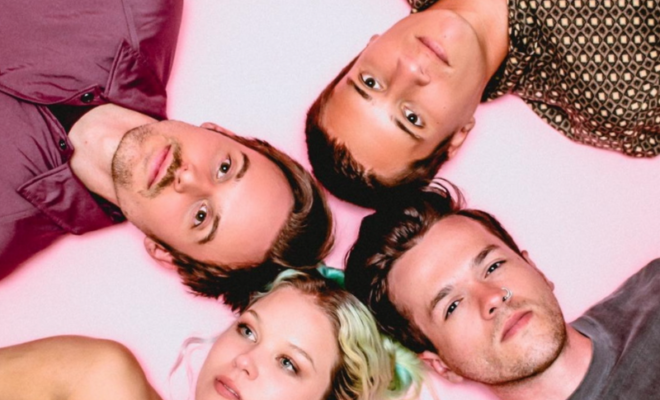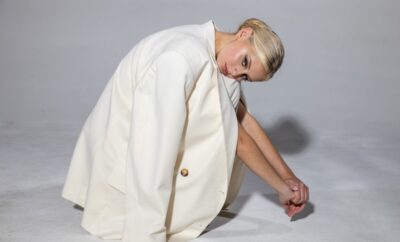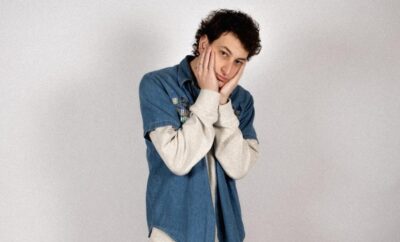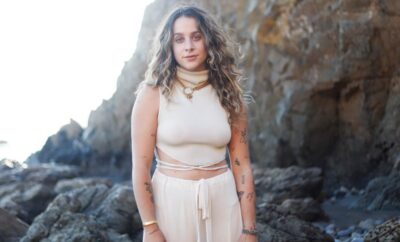
Interviews
Transviolet – Drugs In California
By: Alejandra Gil M
Q) How would you describe your sound?
A) Dreamy pop melodies, cutting lyrics, and lush, hard hitting, oh fuckkkkk yessss production. [laughs]
Q) You moved from the Cayman Islands to Toronto, landing eventually in San Diego and starting Transviolet, talk about that experience.
A) Mike [Panek] first contacted me when I was still living in Cayman. I didn’t have any way to record myself properly, so he was just going off of webcam videos I’d posted online. Somehow, he saw potential there and sent me a track to sing over. Mike had really unique production instincts. He stood out from everyone else who’d reached out to collaborate. His music felt really fresh and exciting and gave me a really warm, earnest vibe, like a sonic hug. He and my cousin helped me get a little recording set up going – a mic, a 2-input interface and garage band – it was no-frills, but we worked like that for almost a year, just sending files back and forth. Fast forward to me moving to San Diego and meeting Mike and Jon. We all clicked and were quickly signed after releasing our first EP as Noise Floor. Judah [McCarthy] joined us and we became Transviolet.
Q) You began to collaborate with producer and bassist Mike Panek across the world. What attracted you to work with him?
A) On first listen, I was immediately drawn to his sonic identity. His music spoke for itself. It was pure and it had emotional depth without feeling too self-indulgent. It didn’t have any pretense, it just felt like good music. I liked its balance of soft, floaty, feminine vulnerability and playfulness with its heavy, assertive, masculine bite. When I first spoke with him, it made sense that that was the music he would make; it was very him. Mike isn’t really trying to impress anyone. He’s just making music he likes. That was something I wanted to be a part of.
Q) What has been your songwriting process like? Do you need music before you can create lyrics?
A) I like switching between different starting points. Sometimes I have something very specific I’m trying to say. In that case, the song comes from a very cerebral place, so I’ll start with lyrics. Other times, I don’t have words. I just have a big feeling and I’ll start with the chords or a vocal melody that encapsulates that feeling. When starting with a track that’s more fleshed out, I’ll usually just play the track and record myself singing gibberish over it.
Then, I’ll write down the first words that come to mind without concerning myself with rhythm or rhymes – more just visualizing what the musical landscape looks/feels like and jotting that down into a word bank. Usually, an instrumental tells me a story and that informs what the song is going to be about. If I get stumped, I’ll step away from the track and start writing a free-form poem about whatever is in the front of my brain that day. Then, I go back and see if any of those lyrics or words from the word bank work over those first-instinct, gibberish melodies. Sometimes they do and sometimes they inspire new melodies. In any case, in the first few minutes, I put pen to paper. I get out of the way and let the song that is in the room with me that day come into being.
Q) Your new single “Drugs in California” is a song about a toxic relationship. What do you hope people take away from it?
A) As I explore my own relationship with addiction and codependency, I hope this song inspires people to reflect on their own addictions. You can be addicted to a drug, or a person, or a feeling. What makes you feel good, what fulfills you, and what leaves you feeling empty in the long run? How are the highs controlling you and how do you feel about being controlled? How can you liberate yourself?
Q) What kind of fan feedback have you been receiving to the track?
A) It’s been getting a lot of love! It landed the Indie Pop playlist on Spotify, the Breakthrough Alternative on Amazon Music and has been getting spins on KROQ which has been really awesome! I think my favorite thing is seeing people create stuff with our music, like dances, videos or visual art. People have been making the song their own. It takes on new meanings. I love seeing that.
Q) When you released your first single “Girls Your Age,” you sent out 2,000 plain manila envelopes to kids across the country containing a cassette tape that only said, “Play me.” How did you come up with that idea?
A) Our manager at the time, JJ Corsini, had the idea. We all thought it was genius.
Q) Twenty-four hours later and Katy Perry tweeted out the song and a week later Harry Styles. Talk about those mind-blowing interactions for you.
A) It was completely surreal. My brain couldn’t make sense of why all these famous people were buzzing about our little song, but it was just one of those songs that took on a life of its own. It said something no one else had said in that way and it spoke to a taboo experience – a teenage girl coming into her own sexuality. It was a story of a seventeen-year-old girl making sense of being hyper-sexualized while trying to assert her own sensuality, her own desires, wants and needs. She looks directly into the male gaze and challenges it. When I was writing girls your age, I wasn’t thinking about all that. I was just processing trauma I’d experienced as a teenage girl, but sometimes music has a way of articulating things we haven’t fully understood ourselves.
Q) You started writing with collaborators like DreamLab, Sam Hollander, Andrew Dawson and Nate Motte of 30H!3. What did you learn or take away from their work?
A) They are all extremely talented producers and songwriters. Something they all had in common was no one was super precious about anything. In co-writing sessions, you just want to keep things flowing. They were all very good at that. That’s what makes them the prolific writers/producers they are. If there’s a person in the room saying no to everything it kills the vibe. In the early days, sometimes I was that person, and it didn’t feel good. I decided I didn’t want to be that person. Perfectionism was getting in the way. I had to let go a little bit. These people were just being their open, vulnerable, go with the flow selves and it was inspiring. It changed how I wrote. When you are doing that amount of writing in a short period of time, you learn how to vibe with whatever is in the room with you that day or you get in your own way and obstruct the song that’s asking you to write it. Whatever is in the front of your brain, whatever’s been eating at you the last week or the last few minutes, that’s the song. Now, when I’m writing with someone, I never say no to an idea unless I think I have a better one. It’s always “yes!” or “how about this instead?”
Q) With concerts currently on hold, what do you miss most about being on stage?
A) I miss the immediate energy and feedback from an audience. I miss letting go in the way only playing a live show permits me to let go.
Q) You now have been headlighting tours in both US and UK, with also millions of streams, how do you think that it has helped you now that you are more involved in the music industry?
A) When people see you live, a personal connection is made. That’s irreplaceable. Being in the same room with someone and feeding off each other’s energy is intimate. I’m reaching out to you, you are looking me in the eyes, we are touching, we are dancing, we are interacting. You can’t replicate that through a screen. Those intimate connections accumulate over time and pretty soon there are millions of people consuming your music, collectively holding this really abstract idea of “Transviolet” together. All those people listening gives us a platform and it opens doors for all kinds of creative opportunities. I’m just so thankful for all of it.
Q) What would you like to say to fans and supporters of you and your music?
A) I’m so grateful to you. Thank you for letting me be myself and loving me for who I am.
All Questions Answered By Sarah McTaggart





You must be logged in to post a comment Login